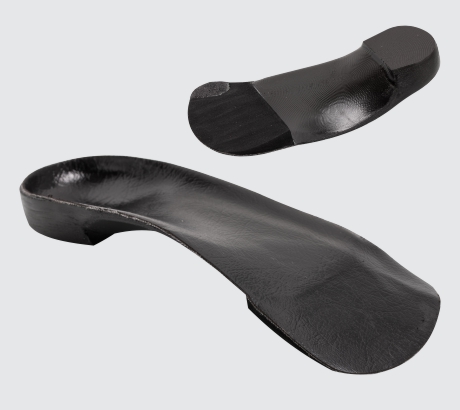By definition, a custom made foot orthotic is a medical device made to control the way a foot functions. There is a significant amount of literature that can scientifically detail what a foot orthotic should be, how they should be diagnosed, and how they should be manufactured. At the end of the day you have only one thing in mind--making your feet and overall body feel better.
A properly prescribed and manufactured foot orthotic inserted into your shoes will correct abnormalities in their biomechanical function, thus reducing pain, providing support, and preventing these deformities from progressing with age. Keep in mind that foot orthotics not only alleviate foot pain but are effective in treating hip pain, lower back pain, and knee pain that are a result of these mal-alignments in the lower body.

There are two basic types of orthotics; accommodative and functional. Accommodative orthotics are designed to simply shift body weight away from the painful area but are not designed or intended to correct the underlying problem. These orthotics are typically made of a soft material and are referred to as "soft orthotics". Functional foot orthotics are designed to specifically correct the abnormality and are the type of orthotic that will provide the highest level of correction and relief.
There are two types of functional orthotics; rigid and semi-rigid. Rigid orthotics are made from a firm material such as plastic or carbon fiber and are designed to aggressively correct mal-alignments of the lower extremity, i.e. pes planus. Semi-rigid orthotics are used for patients needing a more flexible device with more cushioning, i.e. pes cavus.
Stride's custom functional orthotics are made of the highest quality materials to exacting standards. When you receive a Stride orthotic you can be assured that you are wearing thevery best in comfort and correction.
At Stride we carry two types of functional foot orthotics, prefabricated and custom-made. Prefabricated foot orthotics are over-the-counter foot orthotics that do not require a doctor’s prescription. Good foot orthotics will require an evaluation by a qualified practitioner to determine what you need in the design. A doctor may prescribe custom-made orthotics to treat your specific foot, leg, or back problems.
A properly prescribed and manufactured foot orthotic inserted into your shoes will correct abnormalities in their biomechanical function, thus reducing pain, providing support, and preventing these deformities from progressing with age. Keep in mind that foot orthotics not only alleviate foot pain but are effective in treating hip pain, lower back pain, and knee pain that are a result of these mal-alignments in the lower body.

Orthotics are more than just an insole you can buy at most stores. They are a functional device, meant to correct your specific set of symptoms. A “one-size-fits-all” orthotic from a store will not be enough to correct most foot problems, as they are simply arch supports. They are good for some cushioning and might make your shoes more comfortable but aren't designed to correct foot problems.
Prefabricated foot orthotics can be the solution if you do not have severe foot problems or symptoms, or foot deformities that would require a custom orthotic. They can correct biomechanical foot issues such as problems with how you walk, stand, or run. They can also help with foot pain caused by medical conditions such as diabetes, plantar fasciitis, bursitis, and arthritis. Orthotics might even help you avoid surgery to fix flat feet.
Custom Orthotics are highly customized and made individually for your feet by using casts, impressions or scans so that they perfectly fit your foot. Your doctor will only recommend a custom orthotic if a prefabricated orthotic hasn’t proven or won’t prove effective.
Orthotics can be part of a comprehensive treatment plan to address various symptoms, usually having to do with pain and discomfort of the feet and legs. Some obvious signs that you might need an orthotic are things like your shoes wearing unevenly, you are having problems with balance or coordination, or you have a visible flat or high arch.
Prefabricated orthotics are appropriate for:
Custom orthotics are appropriate for:
Nolaro24 Prefabricated orthotics can be used if you do not meet the criteria for custom orthotics.